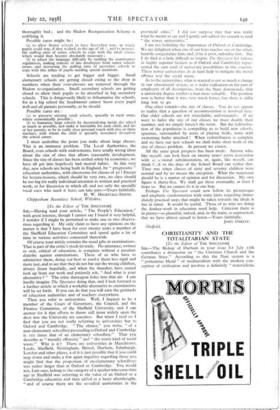[To the Editor of THE SPECTATOR]
Snt,—Having read your article, " The People's Education," with great interest, though I cannot say I found it very helpful, I wonder if I might be permitted to make one or two observa- tions regarding it. My only claim to have any opinions on the matter is that I have been for over twenty years a member of the Sheffield Education Committee and spend quite a lot of time in various activities connected therewith.
Of course your article contains the usual gibe at examinations.
That is part of the critic's stock-in-trade. No utterance, written or oral, critical of education, is complete without a petulant diatribe against examinations. Those of us who have to administer them, doing our best to render them less rigid and more just, and to see that they do not bar out the wrong children,
always listen hopefully, and when the thunders have ceased look up from our work and patiently ask, " And what is your alternative ? " The critic thereupon fades into thin air. I can hardly imagine The Spectator doing that, and I look forward to a further article in which a workable alternative to examinations will be set forth. If you can do that you will earn the gratitude
of education authorities and of teachers everywhere.
Then you refer to universities. Well, I happen to be a member of the Court of Governors, the Council, and the Finance Committee, of the Sheffield University, and I can answer for it that efforts to throw still more widely open the door into the University are ceaseless. But when I read on I find that you are not really referring to universities but to Oxford and Cambridge. " The chance," you write, " of a non-elementary schoolboy proceeding to Oxford and Cambridge is Ito times that of an elementary schoolboy." That you describe as " morally offensive " and " the worst kind of social waste." Why is it ? There are universities in Manch-ester, Leeds, Sheffield, Nottingham, Bristol, Durham, Edinburgh, London and other places, and it is just possible that if you could
step down and make a few quiet inquiries regarding those you might find that the proportion of ex-elementary schoolboys was rather larger than at Oxford or Cambridge. You would not, I am sure, belong to the category of a speaker who some time ago in Sheffield was referring to the value of an Oxford or a Cambridge education and then added as a hasty afterthought, " and of course there are the so-called universities in the provincial cities." I did not suppose that that was really what he meant to say and I gently sub-edited the remark to read " the newer universities."
I am not belittling the importance of Oxford or Cambridge.
We are delighted when one of our boys reaches one or the other, heartily congratulate him, and, if he is poor, subsidise him. But I do find it a little difficult to forgive The Spectator for talking in highly superior fashion as if Oxford and Cambridge repre- sented the sum total of university possibilities in this country. These newer universities do at least help to mitigate the moral offence and the social waste.
As to the universities, what is wanted is not so much a change in our educational system, as a wider realisation on the part of employers of all descriptions, from the State downwards, that a university degree renders a man more valuable. The position now is better than it was, very much better, but there is still a long way to go.
One other remark—the size of classes. You do not appear to realise that a question of accommodation is involved here.
Our older schools are not stretchable, unfortunately. If we were to halve the size of our classes we must double their number, and we simply haven't the room. But the redistribu- tion of the population is compelling us to build new schools, spacious, surrounded by acres of playing fields, some with swimming baths attached ! When redistribution is complete and we have our new schools we shall make short work of the size of classes problem. At present we cannot.
All the same great progress has been made. Anyone who, like myself, can look back on twenty years' active association with cc.' acational administration, or, again, like myself, can
think bz.:k to the days of the School Board can realise that. Time was when classes of sixty and seventy children were
normal and by no means the exception. What the maximum should be is a matter of opinion and for discussion. My own figure is thirty-five. We shall get there eventually, at least I hope so. But we cannot do it in one hop.
Perhaps The Spectator could now follow its picturesque and emphatic condemnation with some hints regarding imme- diately practical steps that might be taken towards the ideals it has in mind. It would be useful. Those of us who arc doing the donkey-work in education need help. Criticism there is in plenty—so plentiful, indeed, and, in the main, so unpractical, that we have almost ceased to listen.—Yours faithfully, Sheffield.
JOHN OAKLEY.











































 Previous page
Previous page